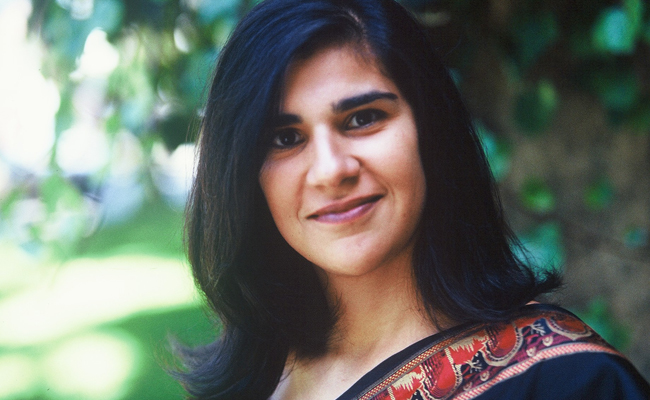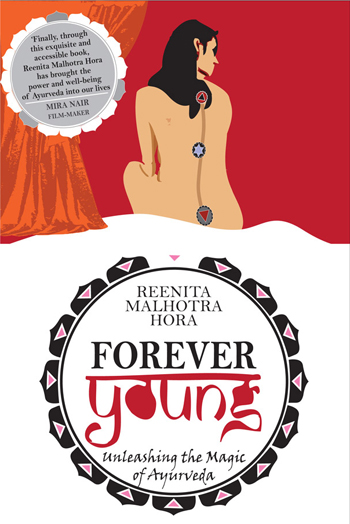We speak with the Ayurveda expert about her journey with the practice and her latest book, Forever Young

With flowing, shiny locks and a definite gleam in her eyes, Reenita Malhotra Hora greets me warmly as we sit down to chat over coffee and tea. Her new book, Forever Young: Unleashing the Magic of Ayurveda has just hit bookstores and aims to unveil the secrets behind the ancient Indian medicine and how people can balance their lives, minds and bodies. I speak with her about her journey to discovering a career in Ayurveda and her work as an author and I learn more about the traditions and practices that have dominated her life and have led many to peak health and inimitable beauty.
HongKongTatler.com: What has your journey with the practice of Ayurveda been like?
Reenita Malhotra Hora: I grew up with Ayurveda in the household not realising that what we grew up with was a medicine. Ayurveda is the science of life and although it’s popularly known as Indian medicine, it’s really about how you live. If you live in connection with the environment, you will always live in peak health.
I went to the United States for college and when I got there, it was a shocking contrast to Mumbai where I had grown up. Where I went to college was small town USA with more cows than people. My classmates would walk around with giant coffees, they would pull all-nighters and always talk about how stressed out they were and how they popped painkillers to get through the day. From my perspective, they were in these endless cycles of destruction and that was the moment where I began to consciously think about Ayurveda and how I had lived a medicine for so long.
HKT: In terms of Ayurveda, what do you think is the most common problem for Hong Kong people?
RMH: Everybody has a few traits from each dosha (mind-body personality) in them. You can determine your happy and healthy state by simply answering some questions about yourself. Having said that, because our lifestyles in Hong Kong tend to be so fast paced and hectic, things can become imbalanced. It is classic city living. In terms of the different doshas – vata, pitta, kapha – people in Hong Kong are definitely more inclined to find an imbalance towards the vata dosha. The vata dosha is dominated by air and space and in a state of excess it can lead to too much movement, which translates to stress and can build up to anxiety, dryness, insomnia, nervous disorders, aches, pains, etc. The imbalance of the vata dosha tends to influence people in Hong Kong more than others, because Hong Kong is such a type-A driven city where if you’re not busy, it’s not cool.
HKT: What can people do to rectify that imbalance?
RMH: In order to re-balance your dosha, you must look to ground, calm and lubricate yourself. When I say lubricate, I mean physically utilising oils for treatments and massages. In Ayurveda, we have oil treatments where we pour oil onto different energetic areas of the body. For someone with a vata dosha imbalance, especially a Hong Kong person, the oil is absorbed remarkably quickly.
Another way to balance one’s vata dosha imbalance is to not eat anything that is abrasive to the internal system or anything that is dry and causes friction in the digestive system, such as uncooked vegetables and baked goods. From a lifestyle perspective, it’s really all about calming down and slowing down, something that people in thriving and bustling cities don’t take much time to do.

HKT: You’ve now written several books, but have just recently published one called Forever Young: Unleashing the Magic of Ayurveda. Can you guide us through your journey as an author?
RMH: I’ve now written three books. The first one, Inner Beauty, was focused on painting a pretty picture of Ayurveda for the common person. The second book, Ayurveda: The Ancient Medicine of India, was created as almost a handbook for doctors that wanted to introduce Ayurveda methods to patients and didn’t know how to talk about it. The book was much more detailed than the first and contained quite a lot of terminologies.
The idea of my third book stems from the fact that the current generation in India is really losing touch with the medicine and this particular way of life; traditions are being lost and people aren’t in touch with their mind-body constitutions anymore. The aim of Forever Young: Unleashing the Magic of Ayurveda is to reach the masses and allow people to get back in touch with the Indian science of life. I want people to think in terms of the Ayurvedic basics once again and for people to allow the practices to become a part of their daily routines.
HKT: Are there any Ayurvedic practices that could be considered unusual?
RMH: Some are simpler and some are more hardcore. By hardcore, I mean you have to practice those methods in an actual Ayurvedic centre.
A simpler practice would be the method of using neti pots for blocked noses and colds and things. There’s definitely a growing acceptance for neti pots now where you can find kits in the supermarkets and drug stores in the US. Sutra neti is a step above that, but still a simpler practice, where you take a rubber tube and insert it into your nostril and bring it out through your mouth and massage your nasal muscle at the back to strengthen it.
I’ve tried every single practice in Ayurveda and of course to me they are not strange; they are my way of life and a way of maintaining my health.
